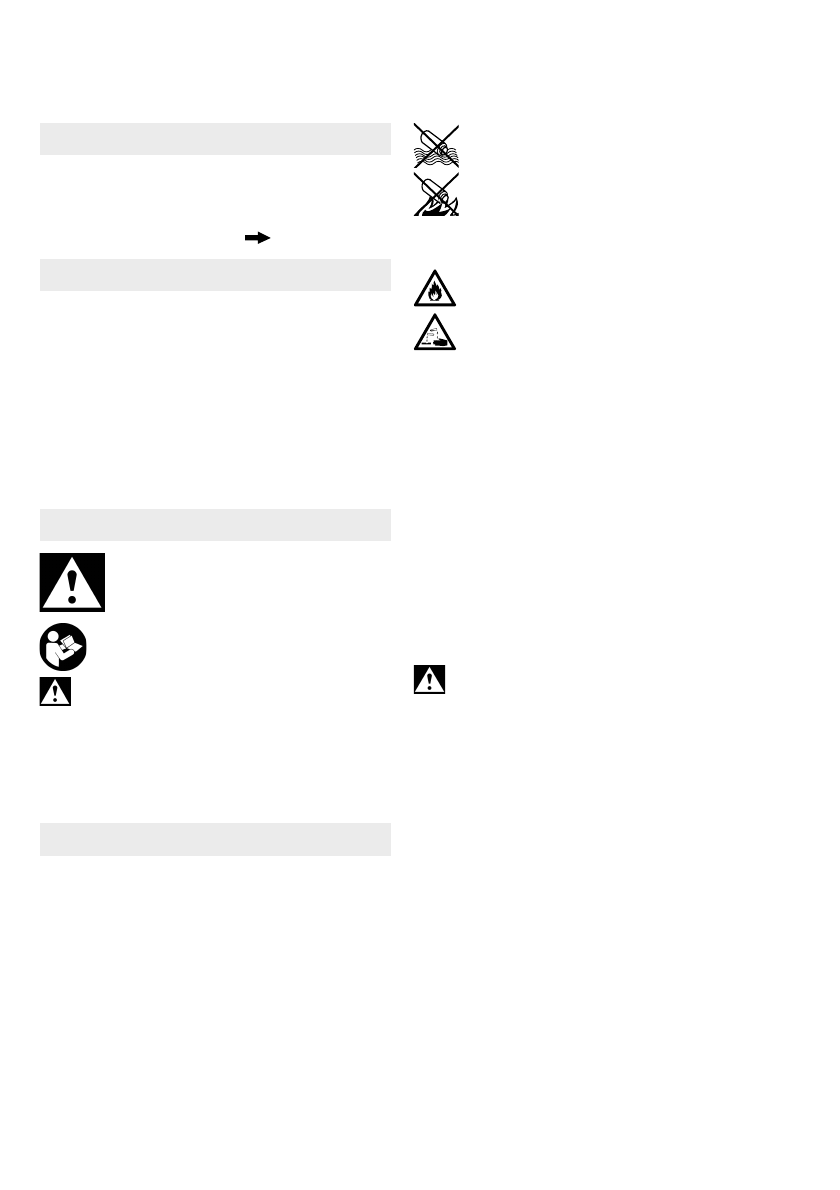Шуруповерты Metabo SB 18 LTX BL I 602352500 - инструкция пользователя по применению, эксплуатации и установке на русском языке. Мы надеемся, она поможет вам решить возникшие у вас вопросы при эксплуатации техники.
Если остались вопросы, задайте их в комментариях после инструкции.
"Загружаем инструкцию", означает, что нужно подождать пока файл загрузится и можно будет его читать онлайн. Некоторые инструкции очень большие и время их появления зависит от вашей скорости интернета.

ENGLISH
en
11
Original Instructions
We hereby declare that these cordless drills/
screwdrivers and impact drills, identified by type
and serial number *1), meet all relevant
requirements of directives *2) and standards *3).
Technical documents at *4) -
Fig. L.
The cordless drills/screwdrivers and impact drills
are suitable for drilling in metal, wood, plastic and
similar materials, and also for screwdriving and
thread tapping.
The cordless impact drills are also suitable for
impact drilling in masonry, brickwork and stone.
The user bears sole responsibility for any damage
caused by inappropriate use.
Generally accepted accident prevention
regulations and the enclosed safety information
must be observed.
For your own protection and for the
protection of your power tool, pay
attention to all parts of the text that are
marked with this symbol!
WARNING
– Reading the operating
instructions will reduce the risk of injury.
WARNING Read all safety warnings and
instructions.
Failure to follow all safety
warnings and instructions may result in electric
shock, fire and/or serious injury.
Keep all safety instructions and information for
future reference.
Pass on your power tool only together with these
documents.
Wear ear protectors with impact drills
(machines with the designation SB).
Exposure
to noise can cause hearing loss.
Use auxiliary handles supplied with the tool
(depending on the model).
Loss of control can
cause personal injury.
Hold power tool by insulated gripping
surfaces, when performing an operation where
the cutting accessory may contact hidden
wiring.
A cutting accessory contacting a "live" wire
may make exposed metal parts of the power tool
"live" and could give the operator an electric shock.
Ensure that the spot where you wish to work is free
of
power cables, gas lines or water pipes
(e.g.
using a metal detector).
Protect battery packs from water and
moisture!
Do not expose battery packs to fire!
Do not use faulty or deformed battery packs!
Do not open battery packs!
Do not touch or short circuit battery pack contacts!
A slightly acidic, flammable fluid may leak
from defective Li-ion battery packs!
If battery fluid leaks out and comes into
contact with your skin, rinse immediately
with plenty of water. If battery fluid leaks out
and comes into contact with your eyes, wash them
with clean water and seek medical attention
immediately!
Remove the battery pack from the machine before
making any adjustments, changing tools,
maintaining or cleaning.
Before fitting the battery pack, make sure that the
machine is switched off.
Keep hands away from the rotating tool!
Remove chips and similar material only with the
machine at a standstill.
Secure the workpiece to prevent slipping or rotation
(e.g. by securing with screw clamps).
LED lights (13): do not observe the LED radiation
directly with optical instruments.
Reducing dust exposure:
Some of the dust created using this power tool
may contain chemicals known to cause
cancer, allergic reaction, respiratory disease, birth
defects or other reproductive harm. Some of these
substances include: lead (in paint containing lead),
mineral dust (from bricks, concrete etc.), additives
used for wood treatment (chromate, wood
preservatives), some wood types (such as oak or
beech dust), metals, asbestos.
The risk from exposure to such substances will
depend on how long you or people nearby are
exposed to them.
Do not let particles enter the body.
Do the following to reduce exposure to these
substances: ensure good ventilation of the
workplace and wear appropriate protective
equipment, such as respirators able to filter
microscopically small particles.
Observe the relevant guidelines for your material,
staff, application and place of application (e.g.
occupational health and safety regulations,
disposal).
Collect the generated particles at the source, avoid
deposits in the surrounding area.
Use suitable accessories for special work. In this
way, fewer particles enter the environment in an
uncontrolled manner.
Use a suitable extraction unit.
1. Declaration of Conformity
2. Specified Use
3. General Safety Instructions
4. Special Safety Instructions






































































